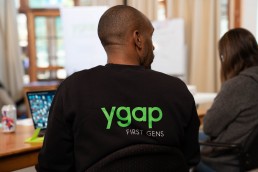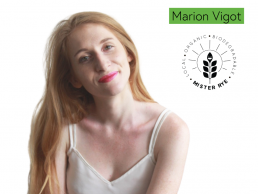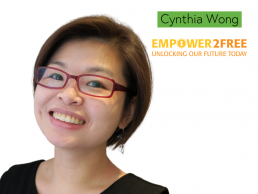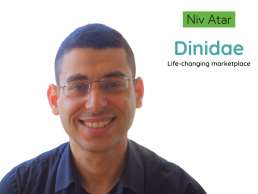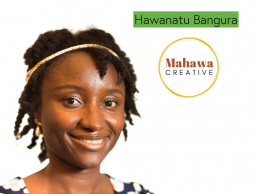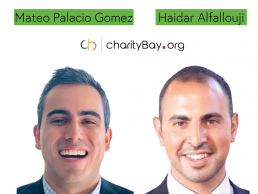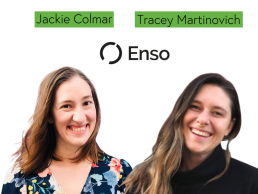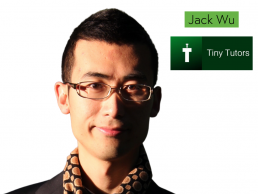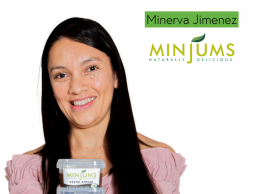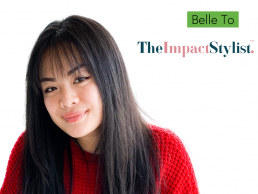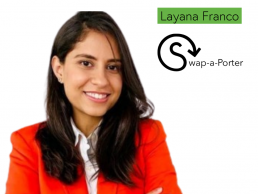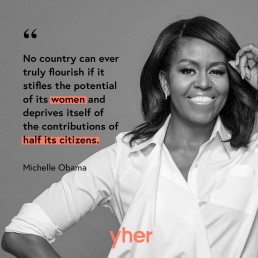Stories of Inspiration: CommUnity Construction
Stories of Inspiration: CommUnity Construction
Every single entrepreneur selected to participate in a ygap program has an inspiring story to share. In this series, we’ll be hearing more from some of our program alumni about why they chose to start their business, some of the lessons they’re learned along the start-up journey, and how things have changed since being involved with ygap. This story is from the ygap First Gens program, supports migrants, refugees and diverse founders born overseas to thrive in the Australian business community. In this edition, we meet Hedayat Osyan, Founder of CommUnity Construction, which supports refugees in Australia to find sustainable and meaningful employment.
Refugees and asylum seekers face enormous challenges while starting their new lives in Australia. Additionally, refugees and asylum seekers are exploited at workplaces in Australia simply because they cannot speak English and lack strong support systems to help them either find a better job or campaign for better working conditions. In fact, 64% of refugees and asylum seekers remain unemployed in the first ten years of living in Australia. According to recent research, only 17% of 30,000 humanitarian refugees from Syria and Iraq who came in 2017/18 found employment in the first two years, despite having skills and qualifications.
CommUnity Construction was established in 2017 to provide education and employment pathways for refugees and asylum seekers in the Australia construction industry. The construction industry is ideal for those new to Australia, as it requires fewer qualifications and training is less time-consuming while still paying a livable wage. So far, CommUnity Construction has trained and employed many refugees and asylum seekers in Sydney. At CommUnity Construction, they believe that their business will be able to help thousands of refugees and asylum seekers find jobs and become independent in the coming years.
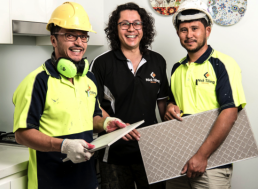
As an ex-refugee from Afghanistan, founder of CommUnity Construction, Hedayat Osyan, knows that it’s extremely difficult to find a job in Australia. While working in the construction industry, Hedayat learned first hand that refugees and asylum seekers are exploited every day through underpayment, pay withholding, threats, and working overtime without appropriate compensation.
Exploitation has a negative impact on lives, as refugees quickly become disappointed and hopeless when they experience exploitation in Australia. Most refugees don’t have a strong command of English and what social connections they have are forced to act as a safety net and support system. Through his interactions with other refugees and asylum seekers and his own lived experiences, he knew he wanted to help. Hedayat holds a Certificate IV in new small business from NSW TAFE, and has honed his business skills with his experience running CommUnity Construction (formerly “Nick Tiling Services”) since 2017.
Hedayat: ‘Refugees and asylum seekers face many challenges in Australia but the main challenge in my opinion, is unemployment. When I finished university and started working, I found that lots of refugees were unemployed and some of them, when they got a job, they were exploited at their workplace due to their lack of English/ skills/networks and support from the government. So they expressed to me personally that they were interested in working and contributing to society but they need a safe environment, a safe platform to contribute to society and to also support their family.
So that’s why I started up and established my construction company, formerly Nick Tiling Services to now “CommUnity Construction” where I help to train and upskill refugees and support them in finding jobs in the construction industry. So far in less than four years, we have employed over 70 refugees and asylum seekers and we can see the impact of having a stable job on their everyday lives.’
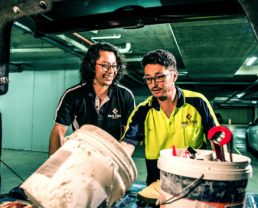
Employment is a vital pathway to achieving independence, but for our most vulnerable, barriers can get in the way. CommUnity Construction addresses these barriers by providing meaningful work experience, skills, confidence, and access to sustainable employment through a unique social enterprise approach. They identified that refugees and asylum seekers are some of the most vulnerable members of society and face enormous challenges when it comes to sustainable employment.
The Settlement Council of Australia reports that only 36 percent of humanitarian entrants find jobs in the first 10 years. This means that 64 percent of people seeking asylum and refugees remain unemployed for more than 15 years or permanently. As a former refugee, the founder, Hedayat Osyan, understands that without a sustainable job, it is impossible to establish a new life and a future for these families. CommUnity Construction provides a safe platform for refugees to find employment and become independent in order to contribute to society effectively.
Hedayat: When I was at the detention centre in Australia, I promised that I was going to work hard to contribute to Australian society. However, when I was released from the detention centre, I faced many challenges. I was exploited by my workplace because I couldn’t speak English at that time. Then when I finished my university, I landed a job. I consider myself lucky because I was under 18 years old and I had the opportunity to go to proper English classes and high school and then university.
However, there are many refugees and asylum seekers who don’t have this opportunity and have ended up unemployed for a long time in Australia and have become heavily dependent on social welfare. I thought I should change this stereotype and negative stigma about refugees where some people say ‘refugees are a burden to society, and they’re always heavily dependent on social welfare.’ I thought if we just work together, we can make a positive contribution to society. Therefore, I established this company, helping refugee and asylum seekers to become independent and contribute to society.
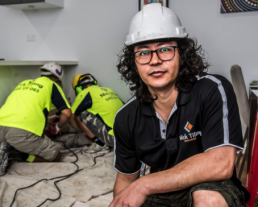
Hedayat was a participant in the November 2018 cohort of the ygap First Gens Program.
Utilising the $1,000 ygap small grant, CommUnity Construction printed t-shirts for its employees as a uniform and a way to build community and identity. A portion of the funds were also used to buy a new grinder, enabling the CommUnity Construction team to complete a technical project in Parramatta. CommUnity Construction used the funds based on their agreement with the ygap team.
At the conclusion of the First Gens Program, CommUnity Construction was selected as a Growth Entrepreneur and was awarded $12,500 in seed-funding. Using this grant, CommUnity Construction intends to purchase a van to transport employees and equipment from worksite to worksite. CommUnity Construction relies on hired transport to move tools from one site to another, which is costly and inefficient. Investing in a van will enormously reduce operating costs.
Hedayat: I studied politics and international relations in university so I had no idea and very minimal skills and no qualifications to run a social enterprise or a construction company. However, when I was accepted into the ygap program, ygap helped me from the beginning to the end, step-by-step. We had different training sessions and tailored support which is important to me. I’m very grateful for ygap where they helped me step-by-step to grow and become a very established company. For example, when I started my company and we had only operated for one year, I thought I’m probably going to just lead a very small company with five people a year. However, since I started working with ygap, they have helped my company to grow and connected me with different mentors, different professionals, such as accountants, lawyers, marketers, etc.
Also, when it came to the funding, it was huge for me. When I received the funding from ygap, this allowed me to purchase a van for my company. Before that, sometimes I travelled twice to take my employees from their homes to my workplace because I had only a small car. However, since I bought the van, it has been a great asset for my company.’
When asked about the value that participating in a ygap program had brought for Hedayat and his company, he had this to say:
Hedayat: I always thought that I knew the problem and the solution to address it. However, when I started with ygap, they tried to push me harder beyond my comfort zone to think about that problem deeply and then they helped me to develop the steps for devising a solution, in a different way from my original idea. It was a very interesting way to develop a solution that is more sustainable. Also in terms of the training, it was very helpful for someone like me, who has no knowledge to be able to run a social enterprise. It would have been impossible, without the support of ygap and their program.’
To learn more about CommUnity Construction, head to their website at https://communityconstruction.com.au/
A new way to Demo Day
Pitches From The ygap First Gens 2020 Cohort
The First Gens program supports the most ambitious, game-changing impact ventures led by migrants and refugees that are improving the lives of people living in disadvantage in Australia.
Australia’s first compostable straw, a social enterprise cafe, a storytelling agency, an online marketplace for social enterprises were among the twelve ventures that were selected for the ygap First Gens 2020 cohort, in our first ever virtual accelerator program.
Instead of holding a face to face Demo Day to finish the program, we decided to change format, asking ventures to instead provide a pitch in video form; a resource they can continue to use into the future, and a more accessible way to culminate the program (Head here for more on why we’re rethinking Demo Days).
We’d like to congratulate these ventures for being resilient, brave and for staying the course during an especially challenging and uncertain year. Below are the video pitches from the 2020 cohort of First Gens so you can hear about the ventures and be inspired by the work they are doing, just like we have been.
You can also show your support by following them on their socials, telling others about their work, or connecting them to a potential customer, investor or supporter.
Watch the pitch videos below:
For more information on First Gens, please contact: Kim Nguyen (First Gens program coordinator) at kim.nguyen@ygap.org.
COVID-19 and its impact on the Australian Entrepreneurial Ecosystem
COVID-19 and its impact on the Australian Entrepreneurial Ecosystem.
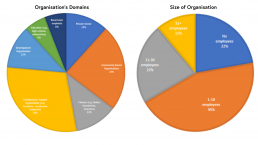
Has COVID-19 caused any substantial changes to your operations?

Some of the changes highlighted included:
- All services (place based programs, events and support, including partnership arrangements) now provided remotely
- Revenue and Funding challenges
- Challenges fulfilling face to face commitments, speaking at events and conducting workshops
- Increased workload
- Focus on portfolio support much higher now, focus on capital preservation
Most significant changes your organisation has seen due to COVID-19
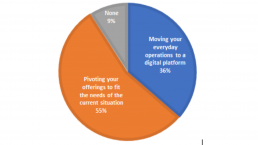
Other challenges included:
- Supporting those on the ground to change to digital offerings, especially in areas where they don’t have internet.
- Capacity of the team in between their own personal challenges while self-isolating and with no volunteers.
- Entrepreneurs are not as digitally aware or knowledgeable as they need to be to pivot their offerings to a new marketplace or about government economic relief packages
We also asked about the most significant challenges that you see the ecosystem facing as a result of COVID. Some of the responses were:
- The demand for services from the social system will be greater than ever but concerns that issues such as gender diversity and climate change will take a back seat, as attention is diverted to traditional economic stimulus.
- Government stepping in and directing what the recovery should be (top-down approach).
- Migrapreneurs might find it hard to get funding/traction
- Working from home is difficult and can be isolating and compounding other problems
- Change in business model for those relying on face to face.
- Those most vulnerable falling through the cracks – also those who don’t engage online can get lost or forgotten.
- Keeping our stakeholders and partners engaged and motivated.
- Ensuring the work we do is still relevant and not a bandaid in these challenging times.
We asked what are the biggest opportunities for ecosystem collaboration and support through Covid-19. Some of the responses were:
- We need a strong and overwhelming voice that shows that social impact businesses can also provide the economic stimulus required to take us through the other side.
- Collaboration on large contracts as the government puts out initiatives. Too often these funding opportunities are dominated by big city firms that have no affinity with rural and regional areas but are able to convey confidence by their size, not necessarily their ability to deliver relevant and timely content.
- Set up small bridge funds to support diverse founders whilst other funding is low.
- Keeping entrepreneurs engaged to reduce the effects of feeling isolated.
- Shifting to virtual delivery
- Moving quickly to solve new problems and leveraging structural shifts in society and the economy
- Entrepreneurs are connecting with each other more and more often
- Entrepreneurs are being supported to think outside the square and provide a different service model / offering
- Entrepreneurs are becoming more tech savvy
- Stakeholders are engaging more and being invited to more ‘meetings’
Launching First Gens 2.0 'Validate' Stage
First Gens 2.0 pre-accelerator welcomes 25 startups into the “VALIDATE” stage

Voicetech apps, artificial intelligence (AI), online marketplaces and story-telling software are some of the 25 startups that have been selected to progress to the “VALIDATE” stage of this year’s inaugural ‘First Gens 2.0’ pre-accelerator, a joint initiative by Catalysr and ygap in Melbourne.
‘First Gens 2.0’ supports migrant and refugee entrepreneurs (“migrapreneurs”) and combines Catalysr’s award winning pre-accelerator model with ygap’s internationally acclaimed First Gens Program to bridge the gap between the ideation, validation and growth phases of an enterprise.
70 startups completed twelve weeks of the “IDEATE” stage comprising of masterclasses, mentoring and community events, culminating in a virtual pitching session which led to the selection of the top 25 startups to participate in “VALIDATE.”
Launched on April 4th, “VALIDATE” consists of a startup bootcamp, weekly sprints and startups events, community events as well as mentoring and support with entrepreneurs-in-residence (EIRs). In response to the pandemic, the program is being run virtually via Zoom and a range of online tools.
The EIRs are renowned industry experts who have been selected to assist the migrapreneurs with coaching, strategic thinking, problem solving and ad-hoc support. The EIR team includes: Pratibha Rai (product expert), Jeanette Cheah (co-founder of The Hacker Exchange, Anthonly Cabraal (Director at Enspiral Foundation), Winitha Bonney (Founder of Amina of Zaria) and Roberto Daniele (Founder at Changemakers’ lab).
While our migrapreneurs face challenges that have been intensified as a result of the coronavirus pandemic, ygap and Catalysr will continue to back our migrapreneurs by providing a supportive community, sharing resources and opportunities so together, we can survive the challenges that lie ahead of us and work towards creating a better world for all.
“Now more than ever, we need more problem solvers. We need more people fearlessly standing up to tackle the challenges we face presently and into the future. These 25 startups represent exactly that. They are rising to the challenge – the work they do, despite these difficult times we face, is very inspiring and I am super excited that we can continue to support them along their entrepreneurial journey.” – Adelide, First Gens Program Manager
“It has been incredible to see these migrapreneurs take on big challenges for the prosperity of Australia and the globe. We have had a very tough job to select the top 25 teams for this stage, some of whom have already launched their products and created value in their community. Especially given the Covid-19 crisis, I can’t wait to see the incredible work all these migrapreneurs will do to tackle directly and indirectly the challenges it poses for our health, work and home life, and economy more broadly” says Usman, CEO of Catalysr.
For more information, please contact: Kim Nguyen (First Gens 2.0 program coordinator) at kim.nguyen@ygap.org.
Supporting diverse founders in Australia
Supporting diverse founders in Australia

ygap is and will continue to support diverse founders in Australia. We are here- backing local change.
Although COVID-19 has brought many shifts around the world, changing the way we work and the way our impact entrepreneurs do business, ygap continues to back local impact ventures to ensure they survive this crisis and the subsequent downturn.
Whilst there is no precedent for what is happening at the moment, we understand that this pandemic is set to have a significant impact on small businesses and vulnerable populations, making ygap’s work, both now and in the long term, more important than ever.
We have been reaching out, talking to and listening to our alumni ventures to identify how we can best support them during this difficult time.
Now, we are eager to understand how our ecosystem partners across Australia who work across the migrant/ refugee and entrepreneurship space are coping and reacting to this crisis, to determine if and how we can best work together to tackle the challenges that arise. As a sector, we are facing rare circumstances that pose new challenges and we recognise the need to think in new ways about how to meaningfully respond.
To help inform the design of our response and the role that we can play as organisations and ecosystem partners, we would value knowing what you believe are the priorities, gaps and opportunities for collaboration. This short survey will only take a few minutes, but provides you an opportunity to share your very important insights and perspectives.
We would also be happy to share insights from these survey findings with the wider ecosystem, once they become available.
Undoubtedly, our work backing local impact ventures has and will change in many ways as we adopt new and virtual ways of working and living – but it continues. We have developed a Resiliency Tool Kit to help ventures prepare and ensure that their businesses survive in the face of unexpected shocks, such as a pandemic. We have also created a directory of “Resiliency in Action” of our ygap Australia and First Gens ventures showcasing how they are adapting and responding to the current situation.
In such uncertain times, we can only take each day as it comes. However, we know that if we unite to share our knowledge, skills and resources; together, we can rise to meet the challenges and support entrepreneurs, businesses and communities to not only survive but to thrive.
Till next time, we will be right here. Backing local change.
First Gens team – Adelide and Kim.
ygap’s yher Appeal - Empowering Women, Ending World Poverty.
ygap’s yher Appeal - Empowering Women, Ending World Poverty.
Opportunities should not be determined by your geography or gender. However, the reality is that two out of three girls are denied an education and of the available funding for businesses around the world, only 3% goes to ones founded by females.
The cherry on top of this disappointing collation of statistics for us was when the World Economic Forum recently released the fact that at this rate it will take 108 years to achieve gender parity and in the mean-time, the global economy is losing trillions of dollars every year.
Men and women are impacted differently by poverty, likewise, they respond differently when receiving an income - with women reinvesting 300% more into their families and communities than their male counterparts.
After spending the last ten years running over 45 accelerators around the world with a gender-neutral approach, our intention was not to discriminate. However, with recent research indicating that this “gender neutral” approach in the social sector underserves women in patriarchal societies - paradoxically, women were still missing out on opportunities.
Go figure.
So at ygap, instead of just talking about this injustice and gap in opportunities, and waiting for someone bigger than us to create this change, we did something about it by launching yher.
yher is a female-focused program that is specifically designed to find the most promising emerging female leaders in developing regions and empower them with access to training, mentorship and access to funding so that they can grow their social impact.
We knew that by investing in women, there would be a significant flow-on effect for societal change in their communities.
During the yher pilot phase in 2017-2018, our team received an overwhelming 847 applications confirming the demand for the program and we went on to support 63 emerging female leaders across Africa, the Pacific and South Asia addressing the UN Sustainable Development Goals.
One of of the women who applied to our yher program was Muzalema Mwanza who had developed a social impact venture, Safe Motherhood Alliance, ensuring safe conditions for mothers and their babies at the time of childbirth.
With the SubSaharan region being the home of 50% of the world’s infant mortalities due to unsterile birthing environments, Muzalema recognised that these were preventable deaths in her community and she couldn’t simply stand by and allow them to happen.
With the development of her home birth kit, Muzalema has not only offered training and employment opportunities, she has also assisted in delivering over 1,000 babies. That’s one woman impacting over 1000 mothers and their babies, and she has only just begun her social impact journey towards a world free of avoidable deaths related to childbirth.
She had a solution to a local problem, all Muzalema needed was someone to find her, believe in her and back her. This is just one social impact entrepreneur’s story of the success that comes with backing local change, there are 453 more stories just like this at ygap.
Unanimously across every benchmark, nations that educate their women and girls end up being more successful in two ways - one being basic fairness and decency, the other being large social and economic returns.
It’s a no-brainer: empower women, end world poverty.
Support us in rolling out the global yher program, by donating before June 30th our cornerstone partner will triple the impact of your donation.
#WorldRefugeeDay - Recognising the Strength, Courage and Resilience.
#WorldRefugeeDay is an opportunity for all individuals, groups and organisations to take a moment to recognise the strength, courage and resilience of the millions of refugees around the world.
In 2018 we had the privilege of meeting an inspiring man by the name of Hedayet Osyan (pictured below), a refugee from Afghanistan whose long journey to Australia was full of horrific hurdles.
Hedayet participated in our First Gens Program where we saw his passion and strength in creating employment opportunities for other refugees and migrants through his successful and growing social impact venture - Nick's Tiling.
"When I was in Afghanistan I hadn’t this freedom and in here I have everything. There’s massive opportunity for every people, there’s equality, there’s freedom and the life is really easy here.
"I’m really happy and I really appreciate the Australian Government, the Australian people who saved my life and I’m always trying very hard to give something back to Australian people, that’s my responsibility because they saved my life."
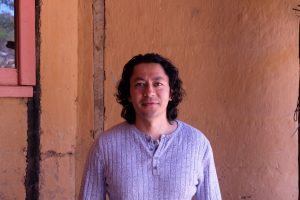
As the human race evolves, we are unfortunately witnessing the highest level of displacement on record with 68.5million people forcibly displaced around the world because of persecution, conflict, violence or human rights violations.
This is three times the population of Australia.
Here in Australia, where 28% of our population is born overseas, we don’t do nearly enough to raise awareness of the strength of migrant and refugee entrepreneurship, nor do we encourage people from other countries to start ventures here, or help them develop skills to build wealth for themselves and the community through self-employment.
Multiculturalism is about diversity, which in turn is about better creativity and decision-making. In order to attract more innovative ideas and grow our nation, we need to share the stories of the migrant-led business, to inspire aspiring migrant entrepreneurs and the broader community.
This is where a program like First Gens step in.
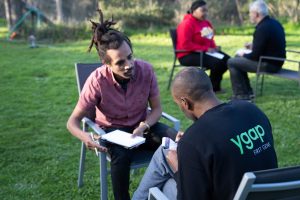
One of the most beautiful moments for us in facilitating the First Gens program for migrant and refugee-led social impact ventures, is when we have the privilege of witnessing a group of individuals from all different cultures, backgrounds, ages and genders, sitting together under one roof collaborating on how to best approach some of the local challenges here in the country.
Australia’s biggest point of difference in the global arena is its multiculturalism. When we all realise that embracing migrants and refugees isn’t just the right thing to do, but it is also a competitive strength in global business, innovation and entrepreneurship, that is the day when the local communities will win and the world will be inspired to unite as one human race.
ygap Newsletter - July 2018
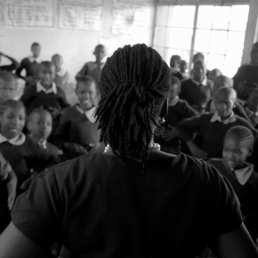
ygap Newsletter
July 2018
“When we talk about impacting a life, we mean creating a job for a mother so she can feed her family. We mean giving a child an education so they have a chance to fulfil their dreams. We mean improving not only their life but their entire community’s future.
Each one of the 586,389 lives that our nearly 400 entrepreneurs have impacted means entire communities have been transformed – the impact goes beyond what we can measure.
We created our model based on empowering local leaders, as they understand the problem better than we ever could. That is why we are so effective and impactful.
Our local leaders have local solutions to local problems. All they need is someone to believe in them and to back them.”
– Manita Ray, CEO
ygap Newsletter - June 2018

ygap Newsletter
June 2018
At ygap, we always tend to think about how can we do better and what’s next, however, sometimes it’s essential to take a moment, to pause and reflect on the incredible impact your support has created. To date, thanks to your support, we have backed 397 impact ventures, through 35 social accelerator programs, which have significantly improved the lives of 586,389 people!

